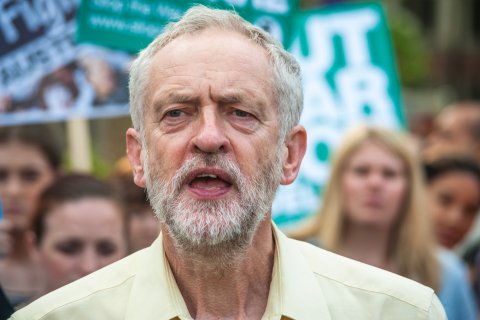
24 July 2015
We're not going to comment on whether he looks like a seadog. His biscuit coloured suits. Or whether he's going to save or destroy the Labour party. That's not our role. But Jeremy Corbyn's views on who should own and run public services are nearer to the public's views than any other Labour leadership contender. Perhaps that’s one reason he is currently riding high in the polls?
Our analysis Privatisation: People vs Politicans highlights the gap between public opinion on public services and mainstream party policies. That gap is huge. We know that a majority of people want to see public services in public hands – 84% for the NHS, 67% for Royal Mail, 66% for rail, 68% for energy, 71% for water. And people feel even more strongly about the powers in our Public Service Users Bill that aim to give the public a say in outsourcing decisions and introduce transparency and accountability for private companies like G4S and Serco.
Our analysis shows that the Green Party reflects public opinion on these indicators very well. Plaid Cymru and SNP policies are also pretty close to public opinion on a number of indicators (although the SNP is currently damaging its reputation with its position on the Calmac ferry).
But Labour, the Liberal Democrats and the Conservatives are way off. (Even though far more Tory voters wanted to keep the East Coast in public ownership than wanted it reprivatised. And 52% of Conservatives want energy and rail brought into public ownership).
Politicians and journalists often like to insist that people don't mind who runs their public services, as long as they work. Take, for example, the Observer editorial last Sunday: “People don’t care if services are top down, or decentralised, run by the public sector or the private sector, so long as they work and neither should Labour.”
This is simply not true. A YouGov poll deals with precisely this issue, asking the British public who they want to run public services and giving them the option of 'Whichever maintains standards' as well as public, private or 'don't care'. 'Whatever works' is actually the least popular option. This poll found that a majority of us want public provision for hospitals, schools, roads, prisons, postal delivery and railways. It may not be the top issue they vote on but people really do care.
And they are right to care. Privatisation keeps failing to deliver – however you measure success. That’s why outsourcing companies are often so unpopular. And there are great examples of the alternative: public ownership, all its forms, from community co-ops to remunicipalisation to the public sector.
The other Labour contenders have sometimes backed up the British public on this. Andy Burnham MP has been an outspoken critic of privatisation in the NHS and has promised to protect it from the Transatlantic Trade and Investment Partnership (TTIP). Yvette Cooper MP has spoken out on the privatisation of the police. And Liz Kendall has said that “when it comes to the public services I am firmly on the side of the public...Services should revolve around the people who use them.” (Which sounds good, but she has also often fallen into the same trap as the Observer, saying that what matters is ‘what works’ rather than who provides services in, for example, the NHS.)
However, of the Labour leadership contenders, only Jeremy Corbyn has signed up to our Public Service Users Bill, which is designed to to promote transparency and accountability over our public services and put public service users first
And only Corbyn clearly supports public ownership of energy and rail, saying of the latter “I believe in public ownership, but I have never favoured the remote nationalised model that prevailed in the post-war era. Like a majority of the population and a majority of even Tory voters, I want the railways back in public ownership. But public control should mean just that, not simply state control: so we should have passengers, rail workers and government too, co-operatively running the railways to ensure they are run in our interests and not for private profit.”
That sounds like the future: cooperative principles, a voice for all of us, in a context of publicly owned services that put people first, not profit. Whether or not Corbyn wins the contest, it's about time all politicians started to recognise that privatisation has a serious PR problem, while public ownership is extremely popular. The seadog is onto something.

Photo used under Creative Commons licensing, thanks to Jason.

Add new comment